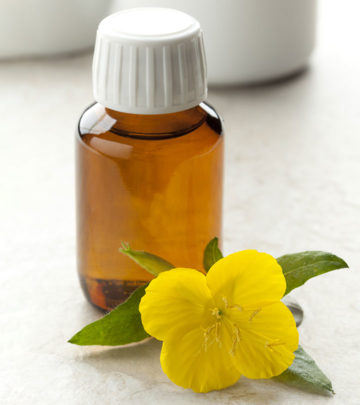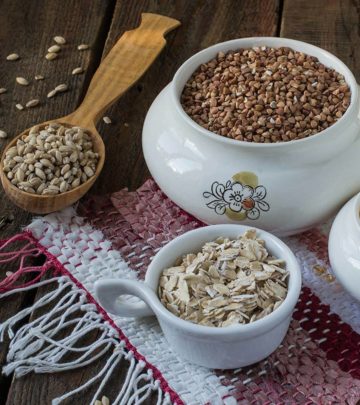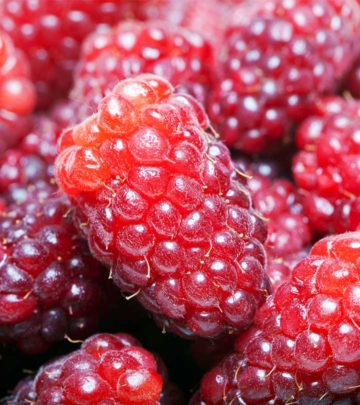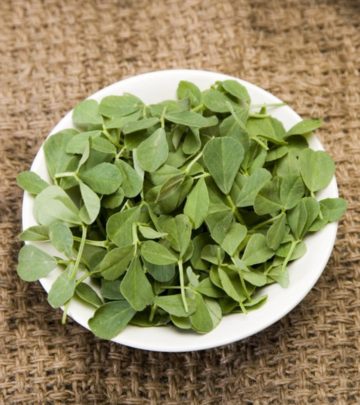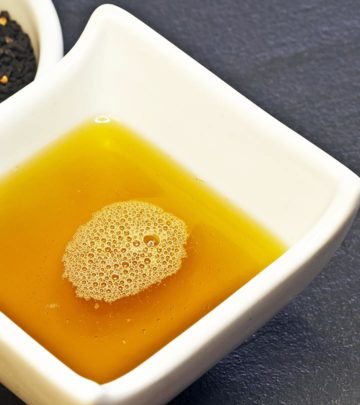11 Amazing Rooibos Tea Benefits: Weight Loss, Skin, And More
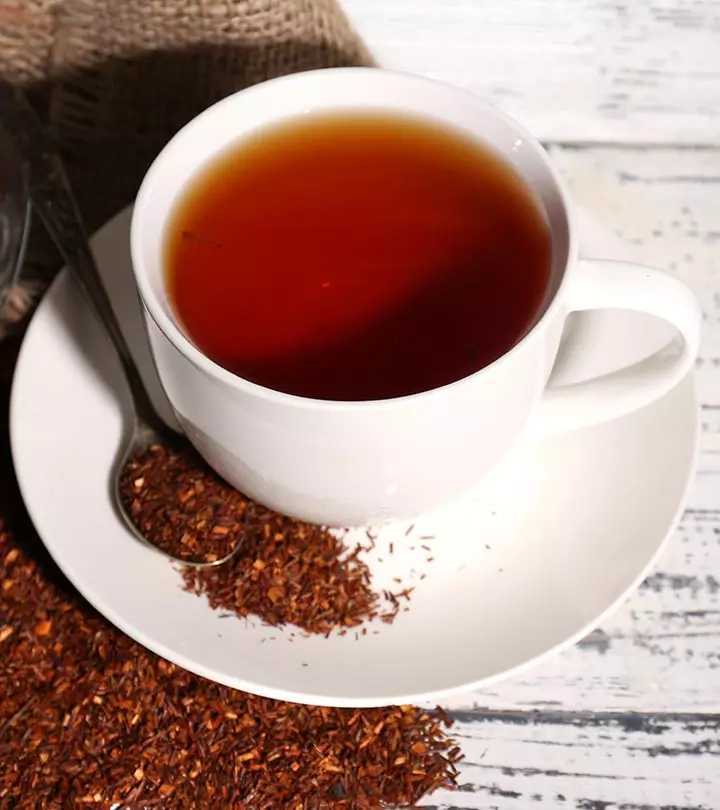
Image: Shutterstock
Rooibos tea or Bush tea is a traditional infusion made from the leaves of a South African shrub named Aspalathus linearis. It is caffeine-free and has less tannin content than black or green teas. It also has more antioxidant content than regular coffee or tea (1).
Rooibos tea is used for treating digestive problems, skin conditions, nervous tension, and respiratory ailments (2), (3).There have been studies regarding its involvement in weight management, bone, and skin health. This article discusses the health benefits of rooibos tea, its preparation method, and its potential side effects.
In This Article
What Is Rooibos Tea?
Rooibos tea is technically not a tea. It is an herbal concoction made by brewing the leaves of a shrub called Aspalathus linearis that is native to coastal South Africa (1)
It is often referred to as the African red tea or red bush tea (or simple red tea). Its characteristic red color is due to the traditional method of using fermented leaves to brew. Its another variant, the green rooibos tea, is made with unfermented leaves. Rooibos tea is rich in antioxidants and has a strong earthy flavor (4), (5).
Rooibos tea majorly has:
- high levels of dihydrochalcones (aspalathin and nothofagin) (6).
- flavonols (quercetin-3-O-robinobioside, isoquercitrin, rutin) (6).
What Does Rooibos Tea Taste Like?
This peachy-colored drink has an earthy taste with a sweet undertone similar to that of vanila. It is sweet and fruity. It has a warm woody flavor and is less intense than the other teas (including black or green teas). Its subtle, nutty taste goes well with milk.
In the following section, we will look at the many health benefits of rooibos tea.
What Are The Health Benefits Of Drinking Rooibos Tea?
1. Is Caffeine-Free
Caffeine, a natural stimulant commonly found in coffee or tea may have some benefits. However, it also may cause serious adverse effects like heart palpitations, sleeplessness, anxiety, and headaches (7). Rooibos tea does not contain caffeine. It works as a great alternative to caffeine.
It also has less tannins when compared with black or green teas (1). Tannins have been found to potentially interfere with iron absorption. Rooibos tea does not pose this risk. In a six-week study, participants did not experience any changes in their iron absorption despite drinking six cups of rooibos tea daily (8).
2. May Have Antioxidant Properties
Animal studies have suggested that rooibos tea helps in liver detoxification due to its antioxidant nature. Other studies have also confirmed that rooibos herbal tea is a good dietary antioxidant source (2), (9), (10). Both fermented and unfermented varieties of the tea have health benefits owing to their antioxidant content (11). These antioxidants fight free radicals released in the body during oxidative stress (12). They lower inflammation and prevent cell damage (12).
Green rooibos tea has aspalathin and nothofagin, which are potent antioxidants that can help detoxify the body and may help promote bone health (13), (14). They also have anti-inflammatory activity (15).
Rooibos tea may help regulate the metabolism of glutathione, though more research is needed in this aspect. Glutathione is a powerful antioxidant (16). Rooibos tea also has different bioactive phenolic compounds, such as dihydrochalcones, flavonols, flavanones, flavones, and flavanols (17). The tea also contains quercetin, another powerful antioxidant that can help boost immunity (17).
However, in one study, those taking rooibos tea did not experience any major antioxidant increase when compared with the control groups (18). Although rooibos tea may be rich in antioxidants, their bioavailability is yet to be examined and understood. Further research can give conclusive evidence.
3. May Boost Heart Health
Investigations have revealed that the consumption of traditional fermented tea can significantly improve lipid profiles and oxidative stress parameters. This can reduce the risk of cardiovascular disease (19),(20). Dietary antioxidants and flavones help reduce inflammation and protect the heart (21).
Rooibos tea has been reported to have a cardioprotective effect as it inhibits the angiotensin-converting enzyme (ACE) (22). More research suggests that rooibos tea can help improve cholesterol levels and reduce oxidative stress (23).
4. May Reduce Cancer Risk
Both fermented and unfermented rooibos teas have chemoprotective properties (24). Rooibos tea has antitumor and antimutagenic activities (25). The tea has been suggested to regenerate coenzyme Q10, which is a compound that helps in cancer modulation (10).
Animal studies using extracts of rooibos (Aspalathus linearis) and honeybush (Cyclopia intermedia) found that these south African herbs can inhibit the growth of cancerous skin cells in mice (26), (27). Antioxidants, such as quercetin and luteolin, also have anti-proliferative activity (28), (29). However, we need more information to understand how these antioxidants in rooibos tea can help with cancer prevention.
5. May Benefit People With Type 2 Diabetes
Rooibos tea contains another antioxidant called aspalathin. This antioxidant may have an anti-diabetic effect (30). In diabetic mice, aspalathin was found to balance blood sugar levels and reduced insulin resistance (31). Aspalathin may also help reduce inflammation resulting from high blood sugar (32). We need more research to further validate the anti-diabetic properties of rooibos tea.
6. May Help In Weight management
Rooibos tea is a low calories, yet delicious. It is rich in antioxidants that reduce inflammation and blood sugar levels, which are factors that increase obesity risk.
Research suggests that aspalathin has the potential to regulate lipid profiles (33). It can also help in reducing hunger and fat storage by inhibiting stress hormones. Studies suggest that rooibos inhibits adipogenesis (lipid accumulation in adipocytes, or fat cells) (34).
Rooibos tea may also decrease the secretion of leptin, which is an enzyme involved in appetite control and regulation of satiety levels (34). Sipping rooibos tea, along with other healthy lifestyle modifications, may help with weight loss.
7. May Improve Bone Health
Research states that tea (green, black and rooibos tea) can improve bone health (35). Fermented rooibos tea was found to have a more potent inhibitory effect on osteoclasts (bone cells that absorb bone tissue during healing) than unfermented rooibos extract (36). Another study linked aspalathin in rooibos tea to an increased osteoblast activity, which eventually may promote bone health (14).
8. May Protect The Brain
Although the evidence is scarce, a study found that dietary antioxidants from rooibos tea can help protect the brain from neurodegenerative diseases (10). The tea also prevents inflammation and oxidative stress. These two factors also happen to increase the risk of brain ailments.
9. May Boost Female Fertility
In animal studies, unfermented rooibos was observed to increase the thickness of the endometrium and weight of the uterus. The tea could also decrease the weight of the ovary. It could help improve fertility in rats (37). However, more studies in humans are warranted.
10. May Have A Bronchodilatory Effect
Traditionally, rooibos tea was used to ward off cold and cough. Rooibos contains a compound called chrysoeriol. This bioactive flavonoid was found to have a bronchodilatory effect in rats. The tea is often suggested for use in treating respiratory disorders (3).
11. May Have An Antimicrobial Effect
The antimicrobial effect of rooibos tea is yet to be studied well. Some research states that the tea may inhibit Escherichia coli, Staphylococcus aureus, Bacillus cereus, Listeria monocytogenes, Streptococcus mutans, and Candida albicans (38). More studies are needed in this aspect.
Rooibos tea may also have some benefits for the skin. In the following section, we will see what they are.
Rooibos Tea Benefits For Skin
The antioxidant and anti-inflammatory properties of rooibos tea are helpful in preventing toxins from damaging the skin cells. These free radicals or toxins can accelerate the aging process.
Folk remedies used rooibos tea extracts to soothe sunburned skin and treat eczema (when applied topically). A few studies suggest that the tea may also improve skin appearance and reduce wrinkles (39), (40). In another study, a formulation of a herbal anti-wrinkle cream containing rooibos was found to be the most effective on reducing wrinkles (41).
Rooibos tea is a good source of ascorbic acid, which is an isolated form of vitamin C (1). Vitamin C is known to help with anti-aging, skin brightening, and reducing hyperpigmentation (42). Vitamin C also boosts collagen production and further promotes skin health (42). Collagen is an integral protein in the skin structure. It keeps the skin firm (43).
These are the benefits of rooibos tea. While some of them have been established by science, the others need more research. However, you can consume rooibos tea at home and start reaping its benefits. Making it is simple. Here’s how.
How To Make Rooibos Tea?
Rooibos tea is made by brewing the tea leaves in boiling water for 3-5 minutes. You can strain the liquid and consume it. Alternatively, you can use a tea bag and let the tea steep for 5 minutes in boiling water.
The tea can also be enjoyed like iced tea. You can flavor it with milk (dairy, almond, cashew) or a natural sweetener (honey). Rooibos tea can also be added to espressos, lattes, and flavored yogurt.
How Many Cups Of Rooibos Tea Should You Drink In A Day?
There is no scientific consensus on the upper limit of drinking rooibos tea. But it is advisable to keep the dosage below six cups, spaced equally throughout the day. A study used six cups of rooibos tea to reap its benefits (8).
However, not everyone is recommended to consume rooibos tea every day. The tea could cause complications in some people.
Does Rooibos Tea Have Any Side Effects?
Rooibos tea is generally safe with negligible side effects. However, there have been some reports where it caused complications with liver function (44).
Rooibos tea may also interact with hypolipidemic medications (6).
In rats, green rooibos tea was found to interact with medications for blood pressure (Atorvastatin) and diabetes (Metformin) (6). If you are under medications, consult your doctor before taking rooibos tea.
Conclusion
Rooibos tea is a healthy and delicious alternative to beverages that contain caffeine. It has been used as a milk substitute for infants with colic. It is rich in antioxidants and has beneficial effects on the heart, bones, and skin. It helps reduce the risk of cancer, and aids diabetes and obesity treatment.
In rare cases, however, it has shown adverse effects. Consult a medical practitioner if you are prone to allergies or adverse effects or on any medication.
Expert’s Answers for Readers Questions
Does rooibos tea stain your teeth?
Beverages with tannins may stain your teeth. This tea has low levels of tannins. Hence, it does not stain your teeth.
Is rooibos tea beneficial for the kidneys?
There is no evidence stating that the tea could be beneficial for the kidneys. It does not do any harm either.
Does rooibos tea reduce belly fat?
There is no direct evidence here. But rooibos tea may help with weight loss by slowing down the accumulation of fat in adipose tissues.
Does rooibos tea make you sleep?
The tea may help reduce stress and calm you down. However, there is no research stating that it may help with sleep.
Does rooibos tea dehydrate you?
Drinking too much tea (any tea) may dehydrate you. You may drink it in moderation and also replenish your thirst by drinking water.
Is rooibos tea a diuretic?
A.Yes, it is a diuretic (like most teas).
Does rooibos tea have potassium?
It does have potassium, which plays an essential role in heart health.
How do you make rooibos tea taste better?
You can enjoy it cold with lemon, ginger, and mint leaves. You can add milk and a spoon of cocoa or hazelnut mix to get a delicious drink. Honey also works well.
Is rooibos tea good for treating iron deficiency?
There is no research here. The tea has iron, though only in low levels.
Does rooibos tea have caffeine?
Rooibos tea contains no caffeine.
Where did rooibos tea originate?
Rooibos tea originated at the Cederberg region of the Western Cape, South Africa.
Is all rooibos tea organic?
No, not all rooibos tea available in the market is organic. Exercise caution while making a purchase. Go for organic rooibos tea, preferably.
44 sources
- Morton, J.F. Rooibos tea,aspalathus linearis, a caffeineless, low-tannin beverage. Econ Bot37, 164–173 (1983).
https://link.springer.com/article/10.1007/BF02858780 - Yoshikawa, T., et al. “Scavenging Effects of Aspalathus Linealis (Rooibos Tea) on Active Oxygen Species.” SpringerLink, Springer, Boston, MA, 1 Jan. 1990.
https://link.springer.com/chapter/10.1007/978-1-4684-5730-8_26 - Khan, Arif-ullah, and Anwarul Hassan Gilani. “Selective bronchodilatory effect of Rooibos tea (Aspalathus linearis) and its flavonoid, chrysoeriol.” European journal of nutritionvol. 45,8 (2006): 463-9. doi:10.1007/s00394-006-0620-0
https://pubmed.ncbi.nlm.nih.gov/17080260/ - Standley, L, et al. “Influence of Processing Stages on Antimutagenic and Antioxidant Potentials of Rooibos Tea.” Journal of Agricultural and Food Chemistry, U.S. National Library of Medicine, Jan. 2001.
https://pubmed.ncbi.nlm.nih.gov/11170567/ - Heinrich, Theres, et al. “Chemistry of Color Formation during Rooibos Fermentation.” Journal of Agricultural and Food Chemistry, U.S. National Library of Medicine, 23 May 2012.
https://pubmed.ncbi.nlm.nih.gov/22571468/ - Patel, et al. “Pharmacokinetic Interaction of Green Rooibos Extract With Atorvastatin and Metformin in Rats.” Frontiers, Frontiers, 27 Sept. 2019.
https://www.frontiersin.org/articles/10.3389/fphar.2019.01243/full - Ruxton, C. H. S. “The Impact of Caffeine on Mood, Cognitive Function, Performance and Hydration: a Review of Benefits and Risks.” Wiley Online Library, John Wiley & Sons, Ltd, 13 Feb. 2008.
http://onlinelibrary.wiley.com/doi/10.1111/j.1467-3010.2007.00665.x/abstract - “African Natural Plant Products Volume II: Discoveries and Challenges in Chemistry, Health, and Nutrition.” ACS Symposium Series.
https://pubs.acs.org/doi/abs/10.1021/bk-2013-1127.ch008 - Canda, B D et al. “Effects of consumption of rooibos (Aspalathus linearis) and a rooibos-derived commercial supplement on hepatic tissue injury by tert-butyl hydroperoxide in Wistar rats.” Oxidative medicine and cellular longevityvol. 2014 (2014): 716832.
https://www.ncbi.nlm.nih.gov/pmc/articles/PMC3967803/ - Hong, In-Sun et al. “Anti-oxidative effects of Rooibos tea (Aspalathus linearis) on immobilization-induced oxidative stress in rat brain.” PloS onevol. 9,1 e87061. 21 Jan. 2014.
https://www.ncbi.nlm.nih.gov/pmc/articles/PMC3897768/ - Villaño, Débora, et al. “Unfermented and Fermented Rooibos Teas (Aspalathus Linearis) Increase Plasma Total Antioxidant Capacity in Healthy Humans.” Food Chemistry, Elsevier, 12 May 2010
https://www.sciencedirect.com/science/article/pii/S0308814610005923 - Pham-Huy, Lien Ai et al. “Free radicals, antioxidants in disease and health.” International journal of biomedical science : IJBSvol. 4,2 (2008): 89-96.
https://www.ncbi.nlm.nih.gov/pmc/articles/PMC3614697/ - Kwak, Soyoung, et al. “Aspalathin and Nothofagin from Rooibos (Aspalathus Linearis) Inhibit Endothelial Protein C Receptor Shedding in Vitro and in Vivo.” Fitoterapia, Elsevier, 12 Dec. 2014.
https://www.sciencedirect.com/science/article/pii/S0367326X14003244 - Sagar, Travers, et al. “Aspalathin from Aspalathus linearis (rooibos) reduces osteoclast activity and increases osteoblast activity in vitro.” Journal of Functional Foods64 (2020): 103616.
https://www.sciencedirect.com/science/article/pii/S1756464619305407 - Lee, Wonhwa, and Jong-Sup Bae. “Anti-inflammatory effects of aspalathin and nothofagin from rooibos (Aspalathus linearis) in vitro and in vivo.” Inflammation38.4 (2015): 1502-1516.
https://pubmed.ncbi.nlm.nih.gov/25655391/ - Townsend, Danyelle M., Kenneth D. Tew, and Haim Tapiero. “The importance of glutathione in human disease.” Biomedicine & Pharmacotherapy57.3-4 (2003): 145-155.
https://www.ncbi.nlm.nih.gov/pmc/articles/PMC6522248/ - Krafczyk, Nicole, Franziska Woyand, and Marcus A. Glomb. “Structure–antioxidant relationship of flavonoids from fermented rooibos.” Molecular nutrition & food research53.5 (2009): 635-642.
https://pubmed.ncbi.nlm.nih.gov/19156714/ - Breiter, Till, et al. “Bioavailability and antioxidant potential of rooibos flavonoids in humans following the consumption of different rooibos formulations.” Food chemistry128.2 (2011): 338-347.
https://pubmed.ncbi.nlm.nih.gov/25212140/ - Marnewick, Jeanine L., et al. “Effects of rooibos (Aspalathus linearis) on oxidative stress and biochemical parameters in adults at risk for cardiovascular disease.” Journal of ethnopharmacology133.1 (2011): 46-52.
https://pubmed.ncbi.nlm.nih.gov/20833235/ - Pantsi, W. G., et al. “Rooibos (Aspalathus linearis) offers cardiac protection against ischaemia/reperfusion in the isolated perfused rat heart.” Phytomedicine18.14 (2011): 1220-1228.
https://www.sciencedirect.com/science/article/abs/pii/S0944711311004570 - Hertog, Michael GL, et al. “Dietary antioxidant flavonoids and risk of coronary heart disease: the Zutphen Elderly Study.” The lancet342.8878 (1993): 1007-1011.
https://pubmed.ncbi.nlm.nih.gov/8105262/ - Persson, Ingrid AL, et al. “Effects of green tea, black tea and Rooibos tea on angiotensin-converting enzyme and nitric oxide in healthy volunteers.” Public health nutrition13.5 (2010): 730-737.
https://pubmed.ncbi.nlm.nih.gov/20144258/ - Dludla, Phiwayinkosi V., et al. “Hyperglycemia-induced oxidative stress and heart disease-cardioprotective effects of rooibos flavonoids and phenylpyruvic acid-2-O-β-D-glucoside.” Nutrition & metabolism14.1 (2017): 45.
https://www.researchgate.net/publication/318335506_Hyperglycemia-induced_oxidative_stress_and_heart_disease-cardioprotective_effects_of_rooibos_flavonoids_and_phenylpyruvic_acid-2-O-b-D-glucoside - Marnewick, Jeanine L., et al. “Chemoprotective properties of rooibos (Aspalathus linearis), honeybush (Cyclopia intermedia) herbal and green and black (Camellia sinensis) teas against cancer promotion induced by fumonisin B1 in rat liver.” Food and Chemical Toxicology47.1 (2009): 220-229.
https://pubmed.ncbi.nlm.nih.gov/19041360/ - Marnewick, Jeanine L., Wentzel CA Gelderblom, and Elizabeth Joubert. “An investigation on the antimutagenic properties of South African herbal teas.” Mutation Research/Genetic Toxicology and Environmental Mutagenesis471.1-2 (2000): 157-166.
https://pubmed.ncbi.nlm.nih.gov/11080671/ - Marnewick, Jeanine, et al. “Inhibition of tumour promotion in mouse skin by extracts of rooibos (Aspalathus linearis) and honeybush (Cyclopia intermedia), unique South African herbal teas.” Cancer letters224.2 (2005): 193-202.
https://www.sciencedirect.com/science/article/pii/S0304383504008687 - Magcwebeba, Tandeka U., et al. “In vitro chemopreventive properties of green tea, rooibos and honeybush extracts in skin cells.” Molecules21.12 (2016): 1622.
https://www.mdpi.com/1420-3049/21/12/1622 - Lee, Lung-Ta, et al. “Blockade of the epidermal growth factor receptor tyrosine kinase activity by quercetin and luteolin leads to growth inhibition and apoptosis of pancreatic tumor cells.” Anticancer research22.3 (2002): 1615-1627.
https://pubmed.ncbi.nlm.nih.gov/12168845/ - Mouria, Michelle, et al. “Food‐derived polyphenols inhibit pancreatic cancer growth through mitochondrial cytochrome C release and apoptosis.” International Journal of Cancer98.5 (2002): 761-769.
https://pubmed.ncbi.nlm.nih.gov/11920648/ - Son, Myoung Jin, et al. “Aspalathin improves hyperglycemia and glucose intolerance in obese diabetic ob/ob mice.” European journal of nutrition52.6 (2013): 1607-1619.
https://pubmed.ncbi.nlm.nih.gov/23238530/ - Kawano, Atsutoshi, et al. “Hypoglycemic effect of aspalathin, a rooibos tea component from Aspalathus linearis, in type 2 diabetic model db/db mice.” Phytomedicine16.5 (2009): 437-443.
https://www.sciencedirect.com/science/article/abs/pii/S0944711308002213 - Ku, Sae-Kwang, et al. “Aspalathin and nothofagin from rooibos (Aspalathus linearis) inhibits high glucose-induced inflammation in vitro and in vivo.” Inflammation38.1 (2015): 445-455.
https://pubmed.ncbi.nlm.nih.gov/25338943/ - Johnson, Rabia, et al. “Aspalathin from rooibos (Aspalathus linearis): a bioactive C-glucosyl dihydrochalcone with potential to target the metabolic syndrome.” Planta medica84.09/10 (2018): 568-583. https://pubmed.ncbi.nlm.nih.gov/29388183/
- Sanderson, Micheline, et al. “Effects of fermented rooibos (Aspalathus linearis) on adipocyte differentiation.” Phytomedicine21.2 (2014): 109-117.
https://www.sciencedirect.com/science/article/pii/S0944711313003140 - Sanderson, Micheline, et al. “Effects of fermented rooibos (Aspalathus linearis) on adipocyte differentiation.” Phytomedicine21.2 (2014): 109-117.
https://pubmed.ncbi.nlm.nih.gov/24060217/ - Nash, L. A., and W. E. Ward. “Comparison of black, green and rooibos tea on osteoblast activity.” Food & function7.2 (2016): 1166-1175.
https://pubs.rsc.org/en/content/articlelanding/2016/fo/c5fo01222h/unauth#!divAbstract - Monsees, T. K., and C. S. Opuwari. “Effect of rooibos (Aspalathus linearis) on the female rat reproductive tract and liver and kidney functions in vivo.” South African Journal of Botany110 (2017): 208-215.
https://www.sciencedirect.com/science/article/pii/S0254629916305257 - Hübsch, Z., S. F. Van Vuuren, and R. L. Van Zyl. “Can rooibos (Aspalathus linearis) tea have an effect on conventional antimicrobial therapies?.” South African Journal of Botany93 (2014): 148-156.
https://www.sciencedirect.com/science/article/pii/S0254629914000726 - Van Wyk, B-E. “The potential of South African plants in the development of new medicinal products.” South African Journal of Botany77.4 (2011): 812-829.
https://www.sciencedirect.com/science/article/pii/S0254629911001190#bb0245 - Mabona, U., and S. F. Van Vuuren. “Southern African medicinal plants used to treat skin diseases.” South African Journal of Botany87 (2013): 175-193.
https://www.sciencedirect.com/science/article/pii/S0254629913002433 - Chuarienthong, P., N. Lourith, and P. Leelapornpisid. “Clinical efficacy comparison of anti‐wrinkle cosmetics containing herbal flavonoids.” International journal of cosmetic science32.2 (2010): 99-106.https://onlinelibrary.wiley.com/doi/abs/10.1111/j.1468-2494.2010.00522.x
- Pullar, Juliet M., Anitra C. Carr, and Margreet Vissers. “The roles of vitamin C in skin health.” Nutrients9.8 (2017): 866.
https://pubmed.ncbi.nlm.nih.gov/28805671/ - Avila Rodríguez, María Isabela, Laura G. Rodriguez Barroso, and Mirna Lorena Sánchez. “Collagen: A review on its sources and potential cosmetic applications.” Journal of cosmetic dermatology17.1 (2018): 20-26.
https://pubmed.ncbi.nlm.nih.gov/29144022/ - Reddy, Shamantha, et al. “Hepatotoxicity due to red bush tea consumption: a case report.” Journal of clinical anesthesia35 (2016): 96-98.
https://www.sciencedirect.com/science/article/abs/pii/S0952818016304226

Community Experiences
Join the conversation and become a part of our vibrant community! Share your stories, experiences, and insights to connect with like-minded individuals.
Read full bio of Girlene Coughlin



